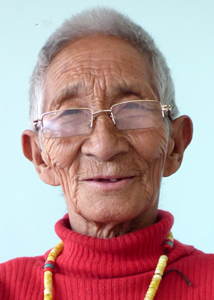Name: Loyak
(Alias: No)
Gender: Female
Interview Age: 85
Date of Birth: 1932
Birthplace: Bhoser, Kham, Tibet
Year Left Tibet: 1959
Profession: Farming, Herding
Monk/Nun: No
Political Prisoner: No

Interview No.: 1U
Date: 2017-04-06
Language: Tibetan
Location: Lingtsang Tibetan Settlement, Manduwala, Uttarakhand, India
Categories: Culture and History
Keywords: childhood memories, Chinese rule -- life under, environment/wildlife, escape experiences, farm life, festivals, food/drink, Kham, nomadic life
Summary:
Loyak was born in 1932 in Bhoser, a small village of eight families in Kham. Her family of eight members engaged in farming and rearing animals. As a young child she enjoyed grazing animals and did not have other work. Loyak talks about the various types crops they grew and when they could be planted. She describes the wild vegetables they searched for and the medicinal plants found in her region. She also explains about nomadic life and how the family relocated to mountain pastures annually.
Loyak recounts the slaughter of animals for consumption, how the yak meat was preserved, and the unique building in which it was stored. Horseracing occurred during the annual festival, Zamling Chisang 'Universal Incense Offering,' which the women could not attend.
After Loyak's father attended meetings called by the Chinese, he told her that life would become "not good" and that the Chinese were confiscating horses and weapons. The family made their escape, but her sister was killed when the Chinese fired on the women while the men put up armed resistance.
Interview Team:
- Marcella Adamski (Interviewer)
- Tenzin Yangchen (Interpreter)
- Tenzin Choenyi (Videographer)

